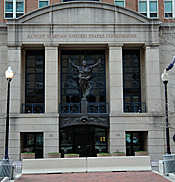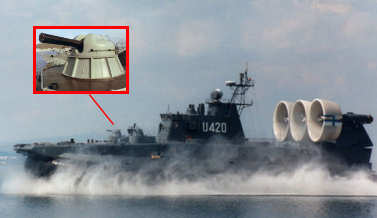 ABOVE: Andrew Shapiro
ABOVE: Andrew Shapiro
Let’s take the good news first.
It comes from Andrew J. Shapiro, Assistant Secretary, Political-Military Affairs at State, in his Keynote Address to ComDef 2009, earlier this month:
I am also happy to report that we are making significant strides in the administration of defense trade, which I know has been a focus of our industry partners over the years. In 2006, DDTC adjudicated just over 70,000 cases in the entire year — with an average processing time of 43 days. In the past eight months, DDTC staff have already acted on nearly 60,000 license applications — and the processing time for each now averages just over two weeks. While we are proud of this improvement, it does not mean we will become complacent. I am committed to ensuring that we continue to be as efficient and transparent as possible in reviewing and processing export license applications.
A similar effort is now being made in the review of Commodity Jurisdiction (CJ) requests. One of the first actions of the new Administration was to streamline CJ adjudication procedures. I now meet with my counterparts at DoD, Commerce, and the National Security Council on a weekly basis to review and resolve outstanding CJ cases. DDTC is building on this process by developing new implementation procedures, including the use of new submission criteria and electronic staffing and adjudication processes that should cut determination time in half by the end of the year.
And Shapiro also had interesting things to say about the U.K. and Australia Defense Cooperation Treaties:
Finally, I would like to give you a brief update on the U.S.-UK and U.S.-Australia Defense Cooperation Treaties — a priority for the Obama Administration. These are a critical element of my defense trade agenda. I am fully engaged with key Members and Senate Foreign Relations Committee staff in seeking a way forward and I’m working to address their concerns about implementing legislation, which the Administration believes is unnecessary. As former Senate staffer, I’m particularly appreciative of the important role that the legislative branch plays in our foreign policy, and I will continue to work closely with Committee staff on a way forward on these treaties.
In other words, the Obama administration has pretty much adopted the position of the former Bush administration on the two defense cooperation treaties and will, if necessary, pass its own rules to implement these treaties even if Congress won’t ratify them. Or at least the White House threatening to do that.
Now for the bad news.
 Several reliable sources have contacted this blog and said that they’ve heard someone over at DDTC saying that “for others” in the definition of “broker” found in section 129.2(a) of the International Traffic in Arms Regulations (“ITAR”) doesn’t mean what you think it means. Traditionally that phrase has been read by the export bar to mean, in a corporate context, unrelated companies or individuals. Now it appears that DDTC may be saying that “for others” applies to other companies in a corporate group. If a company has a wholly-owned foreign subsidiary that assists it in the sale of a defense article, that would, under this strained reading of the definition, mean that the foreign subsidiary is a broker for the parent company.
Several reliable sources have contacted this blog and said that they’ve heard someone over at DDTC saying that “for others” in the definition of “broker” found in section 129.2(a) of the International Traffic in Arms Regulations (“ITAR”) doesn’t mean what you think it means. Traditionally that phrase has been read by the export bar to mean, in a corporate context, unrelated companies or individuals. Now it appears that DDTC may be saying that “for others” applies to other companies in a corporate group. If a company has a wholly-owned foreign subsidiary that assists it in the sale of a defense article, that would, under this strained reading of the definition, mean that the foreign subsidiary is a broker for the parent company.
The registration issues caused by this reading aren’t so hard to handle, at least as long as the parent company makes sure that its subsidiaries are listed on its registration form or amends the form to include its subsidiaries using the procedures described in section 122.4 of the ITAR. The problem is that some of these newly-discovered “brokering” transactions by subsidiaries for parents might require either prior approval or prior notice if those transactions meet the criteria set forth in sections 129.7 and 129.8.
The brokering amendment was meant to capture exports of defense articles by U.S. individuals and companies that would otherwise escape licensing requirements because the export was being made between two foreign countries. It was not meant to cover exports from the United States assisted by foreign subsidiaries of the exporter. So this position by DDTC represents not only an unprecedented intrusion into intra-corporate dealings and structure but also represents an unwarranted departure from the agency’s statutory authority.
Has anybody else gotten wind of this? If so, please share your experience, if you feel comfortable doing so, in the comments section. No need for you to identify yourself or your company, of course. And please, please don’t reference or name any specific officials at DDTC.
 Virginia-based Taipan Enterprises Ltd. pleaded guilty to, and paid a $15,000 fine for, charges that it illegally engaged in arms-brokering without registering with, and obtaining licenses from, the Directorate of Defense Trade Controls (“DDTC”). The Statement of Facts that supported the guilty plea revealed that Taipan’s woes began when its President, Ioannis Papathanassiou, was questioned by U.S. Customs upon returning from Brazil and told the customs agents that he was in Brazil selling farm equipment. An inspection of his luggage revealed product brochures from Agrale for military vehicles which Papathanassiou allegedly falsely stated were for farming purposes.
Virginia-based Taipan Enterprises Ltd. pleaded guilty to, and paid a $15,000 fine for, charges that it illegally engaged in arms-brokering without registering with, and obtaining licenses from, the Directorate of Defense Trade Controls (“DDTC”). The Statement of Facts that supported the guilty plea revealed that Taipan’s woes began when its President, Ioannis Papathanassiou, was questioned by U.S. Customs upon returning from Brazil and told the customs agents that he was in Brazil selling farm equipment. An inspection of his luggage revealed product brochures from Agrale for military vehicles which Papathanassiou allegedly falsely stated were for farming purposes.
 Posted by
Posted by  Category:
Category: 

 In addition to changing the definition of “broker,” the
In addition to changing the definition of “broker,” the 

 Several reliable sources have contacted this blog and said that they’ve heard someone over at DDTC saying that “for others” in the definition of “broker” found in
Several reliable sources have contacted this blog and said that they’ve heard someone over at DDTC saying that “for others” in the definition of “broker” found in  This recently unsealed
This recently unsealed 

